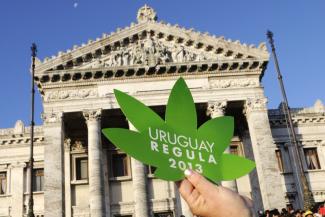Non-traditional agriculture
Caring about cannabis

It was an unusual step regarding an unusual plant: On 10 December 2013, the Uruguayan parliament voted with the governing party Frente Amplio in favour of law No. 19172 which legalises and regulates the production and distribution of marihuana. Although, according to the polling agency Cifra, 63 % of the citizens opposed the reform, the government went ahead with its new legislation. The aim was to deprive drug traffickers of their market.
At present, the demand in Uruguay is estimated to be between 18 and 22 tons per year, worth the equivalent of $ 300 million, and consumed annually by approximately 120,000 persons between the ages of 15 and 64 years. Within a year, the government hopes to establish a legal market to cover a quarter of the local demand. A gramme of marihuana now costs 20 to 22 Uruguayan pesos (less than one dollar) and is sold in pharmacies.
This opens the door for a number of commercial possibilities. At the moment, there is a lot of interest from local farmers, but also from international companies, bidding for a licence for production. Julio Calzada, Uruguay’s Secretary of the Junta Nacional de Drogas, says: "There are even some cases of other governments asking for production licences for growing cannabis for medical purposes and exporting it to their own countries."
The non-governmental organisation Regulación Responsable advocates an "open and honest discourse about marihuana". Martín Collazos, its spokesperson, claims that legalisation gives local farmers and pharmacies "new possibilities of income, all along the value chain". This is also the hope of many poor farmers. Fabián Coitiño is one of them. He says that financially, cannabis „will be a high yield crop, compared with the grains we grow traditionally".
New rules
According to the law No. 19172, the state has control and regulates in detail any activity that has to do with cannabis and its derivatives, like hemp. For the consumption, it defines the various purposes – medical, recreational et cetera. It also considers the use of cannabis for different purposes than consumption, for example producing hemp. The new government agency Institute for Regulation and Control of Cannabis (Instituto de Regulación y Control del Cannabis, IRCCA) is in charge of these matters. It is – as the law spells out – concerned with "plantation, cultivation, harvest, production, processing, storage, distribution and selling of cannabis". It is also responsible for policy measures to reduce damages caused by ill-use of marihuana.
The law defines "psychoactive cannabis" as the flowering tops of the female cannabis plant, with or without seeds, with a natural Tetrahidrocannabinol (THC) content of at least one percent. To buy the drug legally, a person has to be older than 18, a citizen of Uruguay and live in the country permanently. Consumers must choose one of three ways of access to marihuana:
Home-growing is allowed for personal use with up to six plants of psychoactive cannabis and an annual production of not more than 480 grammes. This is done with authorisation and under control of the IRCCA.
Consumer clubs need to be authorised by the state and are under permanent IRCCA control. They have to have a minimum of 15 and a maximum of 45 members. They are allowed to have up to 99 plants of psychoactive cannabis, with an annual storage volume proportional to the number of members, but with a maximum of 40 grammes per person per month.
Commercial distribution is done by pharmacies that have a state licence. Adult Uruguayans can buy psychoactive cannabis there, but they have to register their fingerprints. Whenever they want to buy the drug, they show their ID card and identify themselves via fingerprint. The maximum amount is 40 grammes per month per consumer.
The control mechanism lies in the hands of the state. The state will also grant licences for the production of cannabis that is to be distributed via pharmacies. There are various conditions regarding, for example, the area of farming, origin of the seeds, technical staff, rules against money laundering et cetera. Licences will only be given temporarily. Quality control and packaging will also follow strict norms. Cannabis plantations can only be up to 1,5 hectares each, with a maximum of 10 hectares per farmer. The farmer is responsible for transporting the marihuana directly to the pharmacies.
Farmers are also allowed to produce and sell cannabis seeds, provided they have the licence for doing so. Only the state, though, can import seeds from outside the country. It is also legal to plant cannabis for medical use or pharmaceutical investigation. The farms are controlled jointly by the IRRCA and the Ministry of Health. In order to buy marihuana for medical purpose, any patient needs a medical prescription, as for any other medicine.
By the end of December this year, the legal production and sale of marihuana will be in place. And then, Uruguay will prove to the world whether this is an effective way to combat organised crime – and to what extent smallholder farmers will benefit from the new options.
Sebastián Artigas is postgraduate of philosophy and psychology at the Universidad de la República in Montevideo, Uruguay.
seba.hombrepensativo@gmail.com







